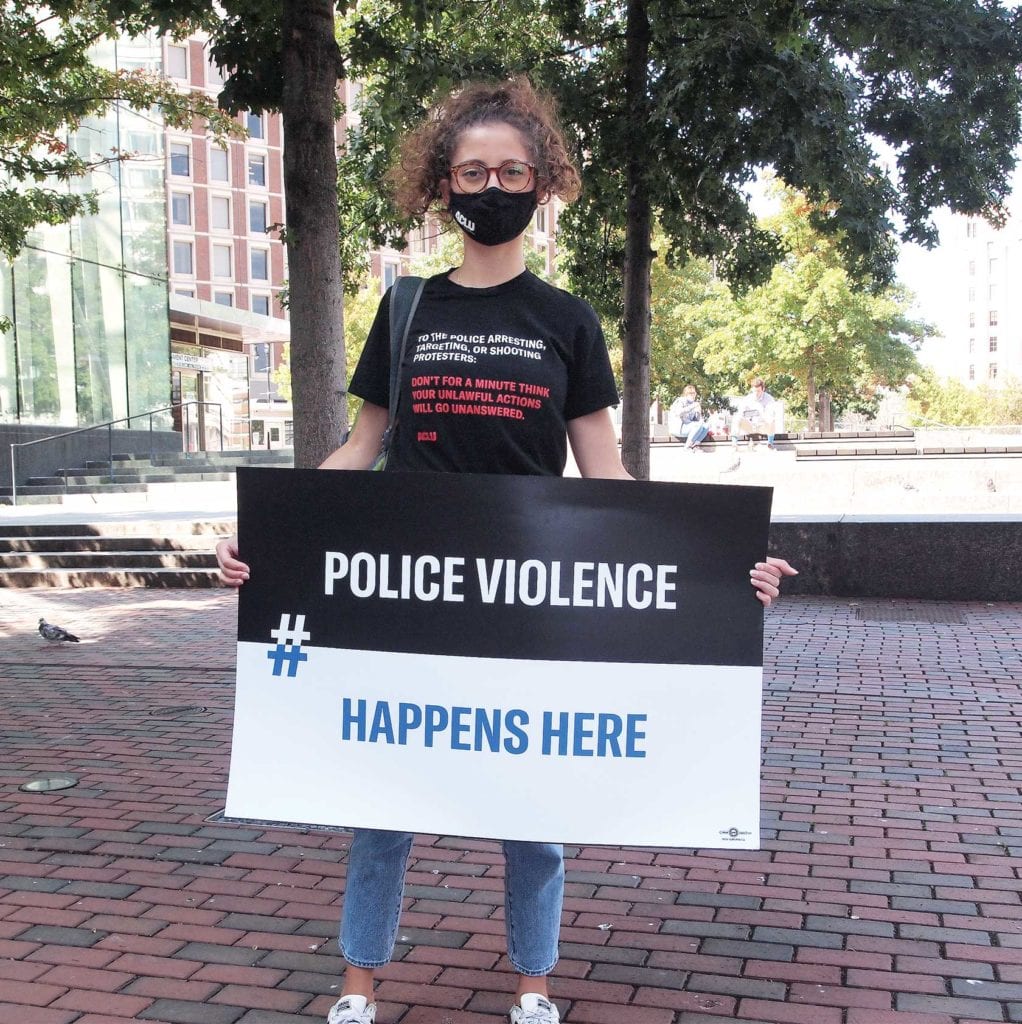
The ACLU of Massachusetts has launched a statewide week of action to bring attention to police violence and misconduct across the commonwealth. The group has released a map identifying victims of police violence and the officers involved, on which most of the points exist in Boston, Springfield and Worcester.
The initiative started Monday, Sept. 21 with a virtual rally, and continued on Wednesday with small stand-ins of one or two people in cities where violence has occurred. During the stand-in, Rahsaan Hall, director of the racial justice program, spoke at Brockton City Hall about the importance of demanding an end to police violence in Massachusetts.
“This last summer, Massachusetts legislators attempted to respond to the cries for justice that were coming from the community. Both the Senate and the House put forward bills that included several pieces of meaningful reform. But in the immediate aftermath of those bills being put forward, there was significant backlash,” Hall said during his speech.
He said ACLU-MA finds this a unique moment to influence the legislature to pass a joint police reform bill, and that the backlash from police implied that law enforcement in Massachusetts was exceptional compared to other states.
“They pressured lawmakers through police unions, chiefs of police associations and individuals, calling legislators and sending emails indicating that Massachusetts is somehow different,” he said.
Sgt. Eddy Chrispin, the president of Massachusetts Association of Minority Law Enforcement Officers (MAMLEO), who spoke out against limits on qualified immunity when the bill was first proposed, told the Banner that he respects the ACLU’s push for change.
“[MAMLEO sees] the need for change in policy,” Chrispin said, “though we may not agree with everything they’re advocating for.”
Chrispin has argued in the past that qualified immunity should not be abolished, but said, “We understand the need for adjustments in qualified immunity.” He also commended ACLU-MA for their work in civil rights.
The new map is ACLU-MA’s main way of bringing attention to the need for a police reform bill. It was created by volunteers and technologists who aggregated points of alleged police misconduct and violence.
Lauren Chambers, staff technologist at ACLU-MA, said that the map amplifies the message that police violence does happen in Massachusetts, despite the state not receiving national attention like Kentucky after Breonna Taylor’s death or Wisconsin after the shooting of Jacob Blake. The map is not an exhaustive collection, and ACLU-MA is welcoming submissions from the public to continue filling out the map.
Chambers said that they received about 18 submissions in 48 hours, which adds to the ACLU’s mission, but is disheartening to add to the alleged violence.
“As we watched the map populate itself … usually that’s a moment of joy and excitement as a programmer to see it come together,” Chambers told the Banner. “But it was really a rough experience.”
The cases listed in Boston include Eveline Barros-Cepeda, a 20-year-old woman who was shot by Boston police in 2002 while in the back seat of a fleeing car; Peter Fanfan, a 29-year-old man who was shot during a police encounter in 2016, and Kasim Kharim, a 29-year-old man who was killed by Boston police after shooting at them in 2016. Rather than rely on police records, the map exclusively references local news sources such as the Boston Globe and WBUR. It also lists the names of each officer involved.
“If you look at the map, you see the areas with the most dots … are indeed the most densely populated urban areas of the state,” Chambers said. She added that the map is not just for legislators and residents to view.
“We also want police to be aware and see that, yes, a lot of people’s lives have been affected by alleged violent actions by the police,” she said.
Hall said that while Massachusetts is fortunate that it has not recently been the subject of a national police brutality scandal, that allows legislators to turn away from the problem.
“Our concern is that legislators will yield to that pressure, and we’re encouraging them to stand up and fight back against this narrative,” he said.






